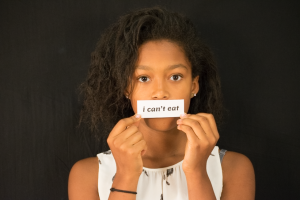More hope for MO
The food in the brain represents how the brain is fueled by food.
When kids don’t eat, they are not only hungry. They are at an increased risk for depression, suicide and substance abuse, according to Delivery community benefit. For the 16.7% of food-insecure households in Missouri, dealing with those effects is a daily challenge. Missouri organizations such as No Kid Hungry MO and Operation Food Search and working day-by-day to reduce that number to zero.
Judy Coyman is the director of community relations at Operation Food Search, a St. Louis childhood hunger non-profit that serves over 200,000 people a month. According to Coyman, in order for someone to be considered food-secure they must have access to food. It must be food they like, food that is not expired and an ability to cook what they have. A lack of any one of these means someone is food-insecure.
“Maybe you don’t have the knowledge, the skills or the resources to get help on how to cook food,” Coyman said. “It would be like leaving a five-year-old at home by themselves. What do they know how to do?”
Missouri was one of 10 states chosen by a private foundation to implement Breakfast After The Bell, a federally-funded program providing breakfast to students in need. Each state was given up to $1.8 million per school district depending on the need, and a year and a half to make breakfast in the classroom happen. St. Louis Public Schools were given $259,268 across 46 schools.
“When kids have breakfast, the classroom is more peaceful,” Coyman said. “Kids learn better and their test scores are better.”
According to Jonathan Barry, program director for No Kid Hungry MO, a Missouri organization connecting children in need with meals before and after school, a major problem is the stigma around hunger. Students who are ashamed of eating at school do not participate in the program and end up skipping meals, he said.
“A lot of times eating breakfast at school is seen as something only the poor kids do,” Barry said. “What schools can do is just change the way breakfast is served so the kids that need that meal aren’t embarrassed or don’t skip that meal.”
There are programs such as Grab And Go which allow students to take their breakfast anywhere in the school. These programs increase participation, however, a lot of schools don’t even know they exist. According to Barry, students in those schools have an opportunity to make a difference. They can bring the attention of their administrators to these programs and encourage them to adopt such programs in their school.
“Generally speaking, students don’t think they have that much of a voice,” Barry said. “But the reality is that if you rattle the cage enough in the right ways, you can make things happen.”
Kirkwood School District has taken initiative in solving the childhood hunger crisis by implementing KSD’s Nutrition on the Weekends (KSD NOW), which allows students in need to take home meals on the weekend. According to Ginger Cayce, KSD chief communications officer, the support from the Kirkwood community has been incredible.
“At the beginning, the goal was to raise $10,000 for 50 students but we have surpassed that,” Cayce said. “The spirit that rallies behind serving students has always been the most amazing things about the entire KSD community.”
There is always work to be done in fighting childhood hunger in Missouri, according to Barry. Last year, 49.3% of students in Missouri qualified for free or reduced lunches and the number stays around 50% each year. However, Barry said while the fight against childhood hunger will be a long battle, it’s the stories of people being helped that continue to inspire him.
“A food-service director at one of my presentations stood up and said ‘a 13-year-old boy came up to me and shook my hand and said thank you,’” Barry said. “He said, ‘now that we have this afterschool meal program, I don’t have to go dig through the dumpster behind the convenience store to find dinner for my little brother and sister.”
Your donation will support the student journalists of Kirkwood High School. Your contribution will allow us to purchase equipment and cover our annual website hosting costs.

Interests: Playing tennis, traveling and watching Netflix.
Favorite musical artist: Billie Eillish.
Favorite quote:“Whenever I’m about to do...

Interests: I love art and spending time with my nieces and nephews!
Favorite musical artist: Conan Gray.
Favorite quote: "You have the moral backbone...















